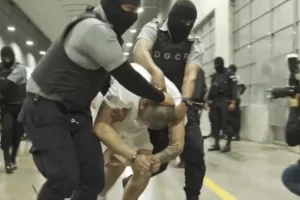
Tonight, the Supreme Court unanimously ruled that Trump Administration must "facilitate" the return of Salvadoran migrant Kilmar Abrego Garcia, whom it had illegally deported to brutal imprisonment in El Salvador's awful CECOT prison (despite his never having been convicted of any crime). The Court largely affirmed earlier rulings by the district court and Fourth Circuit. This is an important win for immigrant rights. The justices rejected the administration's dangerous position that it can deport and imprison anyone it wants - including US citizens - and then be immune from judicial review, so long as the incarceration is done by a foreign state, even one acting at the direction of the US government.
But there is an unfortunate ambiguity in the Court's ruling. Here is the key passage:
Due to the administrative stay issued by the Chief Justice, the deadline imposed by the District Court has now passed. To that extent, the Government's emergency application is effectively granted in part and the deadline in the challenged order is no longer effective. The rest of the District Court's order remains in effect but requires clarification on remand. The order properly requires the Government to "facilitate"Abrego Garcia's release from custody in El Salvador and to ensure that his case is handled as it would have been had he not been improperly sent to El Salvador. The intended scope of the term "effectuate" in the District Court's order is, however, unclear, and may exceed the District Court's authority. The District Court should clarify its directive,with due regard for the deference owed to the Executive Branch in the conduct of foreign affairs. For its part, the Government should be prepared to share what it can concerning the steps it has taken and the prospect of further steps.
The ambiguity here is what exactly it means to "facilitate" Abrego Garcia's return to the US. Does it require the government to do everything possible to ensure that return, merely make some token effort, or something in between? To my mind, the best interpretation is "everything possible." That reading is implied by the Court's admonition that the government must "ensure that his case is handled as it would have been had he not been improperly sent to El Salvador." The only way to do that is to actually return him!
As a practical matter, Abrego Garcia is only being held by El Salvador because the US government wants him to and is paying the Salvadoran government to incarcerate him and other deportees (including many illegally deported under the Alien Enemies Act). All Trump has to do to get any of these people released is credibly convey to the Salvadoran that that is what he wants. But I worry the Trump administration will drag its feet and claim all the Supreme Court ruling requires is make a pro forma request that the Salvadorans know they could refuse without suffering any adverse consequences.
In my analysis of the lower court rulings, I explained why, in this context, there is no good reason to grant any deference to executive claims that the president cannot be required to return a prisoner held by a foreign state. Nonetheless, the administration is likely to continue its efforts to weasel its way out of doing the right thing.
At the very least, there will probably be further wrangling in the lower courts over the exact meaning of "facilitate" and how it may or may not differ from "effectuate." This is the kind of word game some lawyers like to play - even if it's also the kind of thing that causes many people to hate lawyers! It might even be entertaining - except for the fact that as long as this goes on, an innocent man will continue to rot in a terrible prison, where he was unjustly sent without any due process.
Perhaps this ambiguity was the price of getting a unanimous ruling. But it's unfortunate, nonetheless.
In a concurring statement joined by the other two liberal justices, Justice Sonia Sotomayor outlines the stakes of the case, and gives her own interpretation of what the ruling requires:
The United States Government arrested Kilmar Armando Abrego Garcia in Maryland and flew him to a "terrorism confinement center" in El Salvador, where he has been detained for 26 days and counting. To this day, the Government has cited no basis in law for Abrego Garcia's warrantless arrest, his removal to El Salvador, or his confinement in a Salvadoran prison. Nor could it….
The Government now requests an order from this Court permitting it to leave Abrego Garcia, a husband and father without a criminal record, in a Salvadoran prison for no reason recognized by the law. The only argument the Government offers in support of its request, that United States courts cannot grant relief once a deportee crosses the border, is plainly wrong….
Because every factor governing requests for equitable relief manifestly weighs against the Government, Nken v.Holder, 556 U. S. 418, 426 (2009), I would have declined to intervene in this litigation and denied the application in full.
Nevertheless, I agree with the Court's order that the proper remedy is to provide Abrego Garcia with all the process to which he would have been entitled had he not been unlawfully removed to El Salvador. That means the Government must comply with its obligation to provide Abrego Garcia with "due process of law," including notice and an opportunity to be heard, in any future proceedings... It must also comply with its obligations under the Convention Against Torture…. Federal law governing detention and removal of immigrants continues,of course, to be binding as well. See 8 U.S. C. §1226(a) (requiring a warrant before a noncitizen "may be arrested and detained pending a decision" on removal; 8 CFR§287.80)2) (2024) (requiring same)…. In the proceedings on remand, the District Court should continue to ensure that the Government lives up to its obligations to follow the law.
Sotomayor is right on all points. And the only way to ensure the government "lives up to" all these obligations is to ensure that Abrego Garcia is actually returned to the United States. Giving it the old college try won't cut it.
But Sotomayor, like the Court's ruling, does not unambiguously define what it means to "facilitate." And her statement, on behalf of only three justices, is not by itself legally binding.
An ethical government would avoid further litigation and just simply ensure Abrego Garcia's return. They could easily do that! Indeed, they would have done so - at the very least - as soon as they realized he had been illegally deported in the first place. Both respect for the rule of law and minimal common decency require them to promptly return a man they have admitted was illegally deported and imprisoned. But this administration, to put it mildly, doesn't much care for either law or decency when they get in its way.
In sum, the Court's decision is an important win for immigrants, and setback for the administration. But it has a notable - potentially problematic - ambiguity. Just how much of a problem that turns out to be remains to be seen.
The post Supreme Court Rules Trump Administration Must "Facilitate" Return of Illegally Deported Salvadoran Migrant appeared first on Reason.com.







